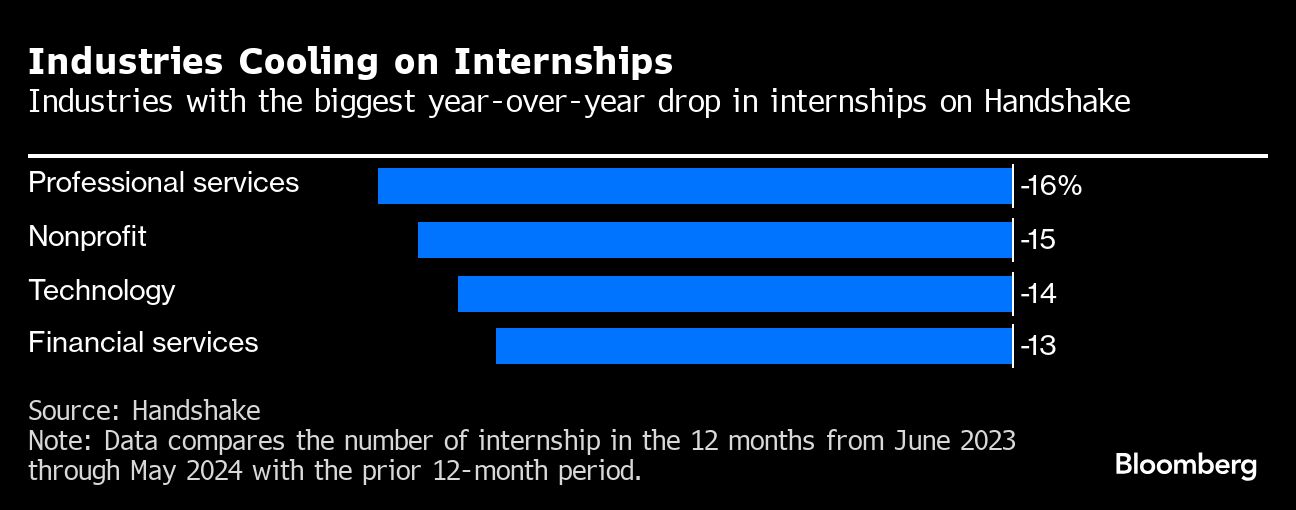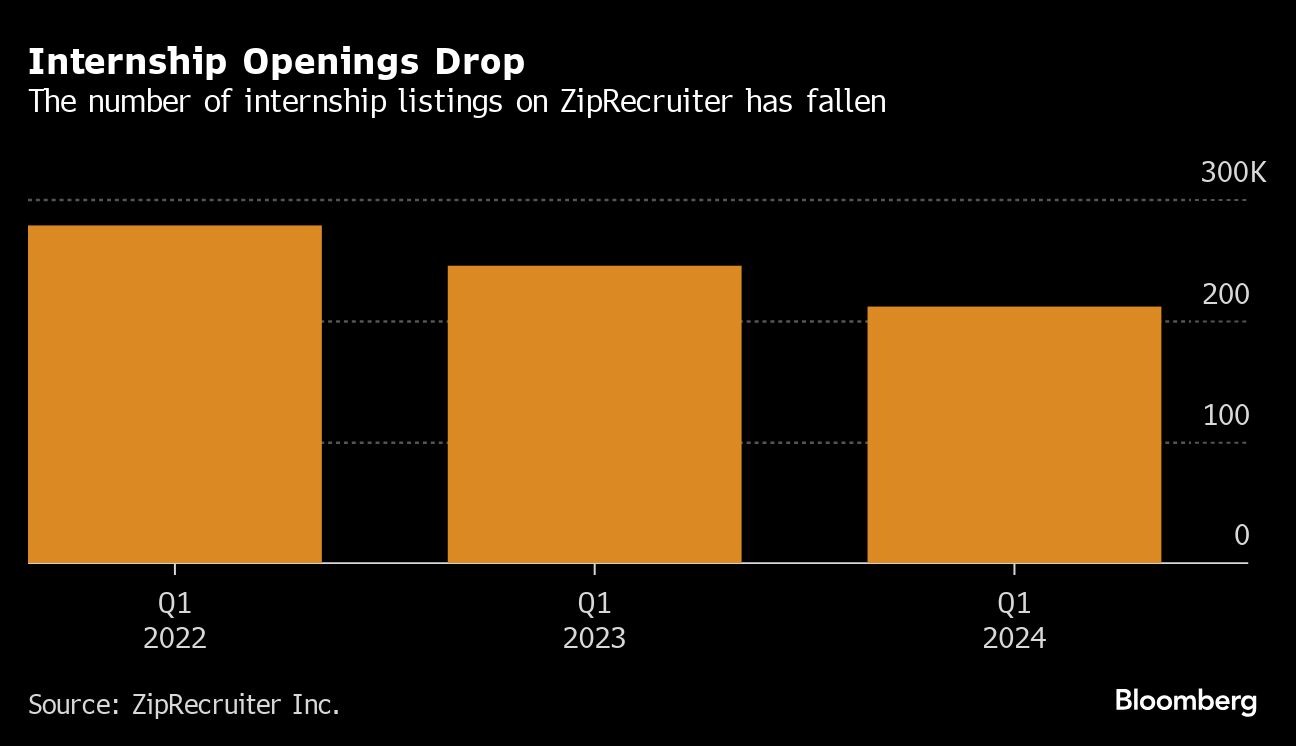Companies are hiring fewer interns this summer, and that’s cranked up competition among college students and new graduates for a crucial entry point into the workforce.
The total number of internships listed on Handshake, a job search platform for college students, fell more than 7 percent from last June through May compared with the same period a year earlier. And the average number of applications that each internship drew jumped to 93, up from 53 the previous year, according to an analysis by Handshake provided to Bloomberg exclusively.
“Honestly, I don’t remember a time when getting an internship has been this challenging since I have been working in this space,” said Lesley Mitler, a career coach who has worked with college students for almost 15 years.

The tougher road for internship seekers reflects companies’ move to temper entry-level hiring. That’s especially true in fields like finance, consulting and tech, which have cooled dramatically amid industry-wide layoffs. Last month, Tesla Inc. made the unusual move of rescinding summer internship offers as Chief Executive Officer Elon Musk pushed to cut headcount at the company, leaving students in the lurch weeks before the program was set to start.
Executives are laser-focused on efficiency and cost-cutting, making internships an investment that many companies aren’t prepared to make right now. “Internship programs are expensive: You have to use part of your HR team to oversee these interns and make their lives great,” said Julia Pollak, chief economist at job site ZipRecruiter, which registered a 14 percent drop in internship listings in the first quarter compared with the same period last year. “You have to pay them and not necessarily get great quality work out of them.”

Some companies that have pared back internship programs are offering workshops that cost less and come with a lower time commitment, said Sean McGowan, director of employer relations at Carnegie Mellon University. “None of these companies can afford to take their brand fully out of a campus — you’ll lose your talent to your competitor,” he said. Educational programs — like those offered by Morgan Stanley for rising sophomores or Goldman Sachs Group Inc. for all undergraduates — are a way to keep students interested in the companies even when fewer formal opportunities are available.
For those entering the job market, the chances of landing one of the most desirable opportunities has gotten slimmer. Goldman Sachs, for example, saw a record number of applicants this year — over 315,000 resumes for only 2,700 spots, an acceptance rate of less than 1 percent. That’s up from over 260,000 applications for some 2,900 spots last year.
Other companies are re-evaluating their internship programs after pandemic lockdowns forced them to cancel them or make them fully remote. “Ever since, companies have struggled to figure out what to do with the interns,” Pollak said — especially as there are fewer people in the office to oversee them. “Many companies have pulled back on those programs because they can’t really figure out how to do it that well.”
For students, the stakes are high: According to recent research by the Burning Glass Institute and the Strada Education Foundation, those who don’t complete an internship while in school are at substantially greater risk of long-term underemployment.
Isabel Cramer, a rising senior at the University of Toronto, applied to over 40 internships this spring, spending hours tailoring her resume and cover letter to each role. When an offer failed to materialize, Cramer was disappointed — but ultimately decided to take the summer to develop her video editing skills and build her presence on TikTok. It’s an experience she hopes will help her land her ideal social media marketing job in the future. “The whole point of internships is to be more prepared for the job market,” she said. “So, I’m like, ‘What ways can I do that by myself?'”
Jade Bahng, a rising junior at the University of Southern California, applied to 118 internships before securing a marketing role with Korean entertainment company CJ ENM. Out of those applications, only six resulted in face-to-face interviews. The process was nerve-wracking, and in some cases moved slowly. Bahng said it appeared that choosing an intern wasn’t at the top of most hiring managers’ to-do lists. “A lot of these companies are busy, and they’re trying to stay lean,” she said. “But for me, landing an internship is the biggest priority of my spring semester.”
The challenges for job seekers also extend to entry-level jobs, where offers aren’t always what they appear to be: Tech companies such as Alphabet Inc. and Meta Platforms Inc. last year withdrew offers, while consulting firms Accenture Plc. and Deloitte LLP have delayed start dates for new hires.
In this atmosphere, more students continue to interview even after they land a role, according to Carnegie Mellon’s McGowan, given that companies are reneging on offers. “There was a trust that was broken in the last couple years,” he added.
To stand out, career coaches say it’s more important than ever to network aggressively.
Ryan Levine, a rising senior at Colby College, began applying to internships last summer, putting in close to 60 applications. Levine crafted each cover letter with care and diligently networked with employees, mostly recent college graduates, at each company on LinkedIn. But by February, he still hadn’t gotten a single interview — and was starting to get nervous.
Levine reached out to someone who ended up being very senior at New York Life Insurance Company who helped him land the role. “It just worked out. I got very, very lucky with that one,” he said. “If I didn’t get that then it would have been really late — I would’ve been struggling to find anything.”





















 AIG, Chubb Can’t Use ‘Bump-Up’ Provision in D&O Policy to Avoid Coverage
AIG, Chubb Can’t Use ‘Bump-Up’ Provision in D&O Policy to Avoid Coverage  Chubb CEO Greenberg on Personal Insurance Affordability and Data Centers
Chubb CEO Greenberg on Personal Insurance Affordability and Data Centers  Beazley Agrees to Zurich’s Sweetened £8 Billion Takeover Bid
Beazley Agrees to Zurich’s Sweetened £8 Billion Takeover Bid  20,000 AI Users at Travelers Prep for Innovation 2.0; Claims Call Centers Cut
20,000 AI Users at Travelers Prep for Innovation 2.0; Claims Call Centers Cut 




